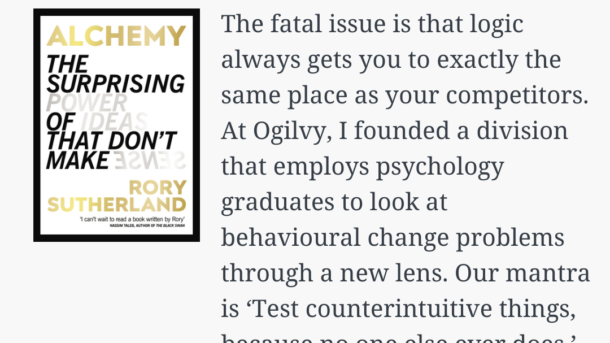The fatal issue is that logic always gets you to exactly the same place as your competitors. At Ogilvy, I founded a division that employs psychology graduates to look at behavioural change problems through a new lens. Our mantra is ‘Test counterintuitive things, because no one else ever does.’ Why is this necessary? In short, the world runs on two operating systems. The much smaller of them runs on conventional logic. If you are building a bridge or building a road, there is a definition of success that is independent of perception. Will it safely take the weight of X vehicles weighing Y kg and travelling at Z mph? Success can be defined entirely in terms of objective scientific units, with no allowance for human subjectivity.* This may be true when you are building a road, but it is not true when you are painting the lines on it. Here, you have to consider the more complex component of how people respond to informational cues in their environment. For instance, if you want vehicles to slow down, painting parallel lines across the road in the approach to a junction at increasingly smaller intervals will help, since the narrowing gaps between the lines will create the sensation that the car is slowing less than it really is. Americans aren’t terribly good at designing roundabouts, or ‘traffic circles’ as they call them, simply because they don’t have much practice.* In one instance, a British team was able to reduce the incidence of accidents on a traffic circle in Florida by 95 per cent by placing the painted lines differently. In one Dutch town traffic experts improved traffic safety by removing road markings altogether.* So there are logical problems, such as building a bridge. And there are psycho-logical ones: whether to paint the lines on the road or not. The rules for solving both are different; just as I make a distinction between nonsense and non-sense, I also use a hyphen to distinguish between logical and psycho-logical thinking. The logical and the psycho-logical approaches run on different operating systems and require different software, and we need to understand both. Psycho-logic isn’t wrong, but it cares about different things and works in a different way to logic. Because logic is self-explanatory, our preference is to use it in all social and institutional settings, even where it has no place. The result is that we end up using inappropriate software for the operating system, neglecting the psycho-logical approach.
I’m guilty of being one of those who take pride in being “logical” or a rational person. I like to think that I rely on reason to justify my decisions. Relying on logic even becomes something of a comfort zone for me in the sense that I use to make myself feel better whenever making decisions with uncertain outcomes.
The biggest issue is, you can pretty much find a logical reason for anything. In fact, relying on conventional logic becomes less effective when it comes to solving problems for humans, as we are are all highly complex beings with different motivations, emotions and are perfectly capable of contradicting ourselves.
Thus, its important not to sometimes let the allure of logic trap us from finding these counter-intuitive solutions. I have realised before that I have used logic as a tool to shut down suggestions from co-workers that I did not like. In fact, I probably used my ability to construct logical arguments to support the those who I did like. On reflection, I find that my personal feelings or insecurities end up subconsciously driving our behaviour more than I realised at those moments.
What I have been finding to really help is to always be open-minded and be aware of our own personal biases. Be willing to consider the opposite and counter-intuitive at times. If you’re constantly trying to imitate what “competitors” do, you’ll essentially be blending in. You’ll become more average, and will be much less likely to be exceptional. Of course, this isn’t some folk wisdom to take heart for all aspects of your life as if you never copy what others do, you might also end up being far worse than average.



